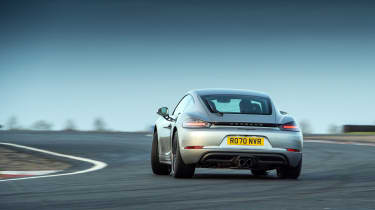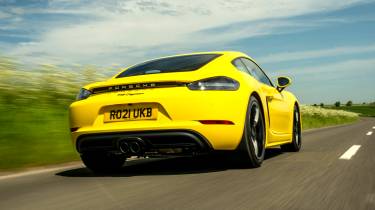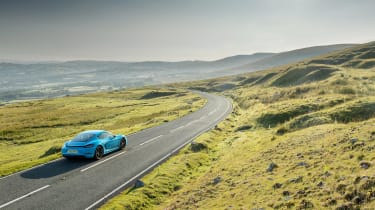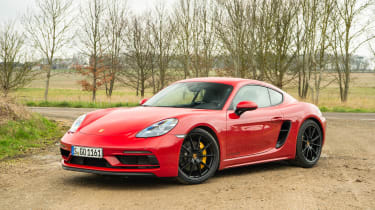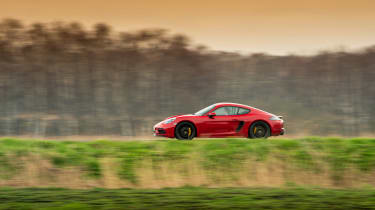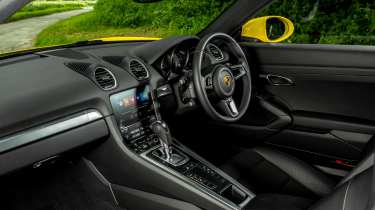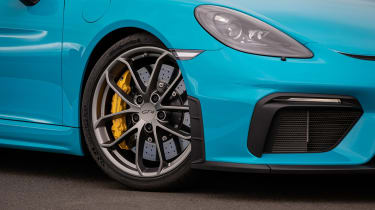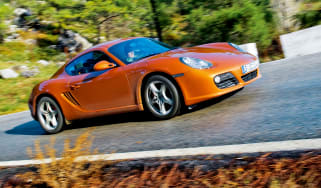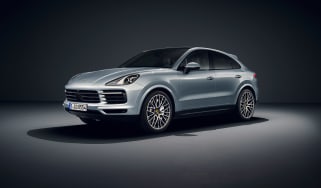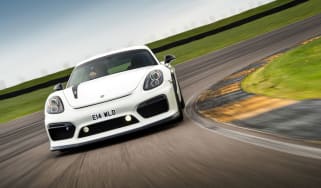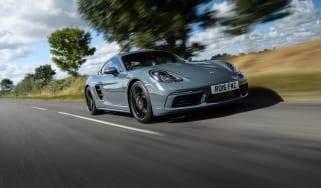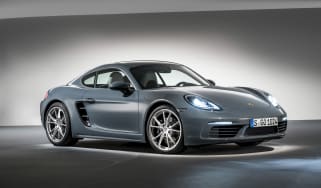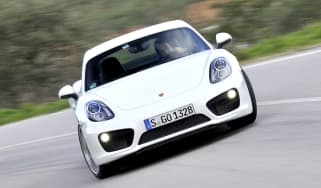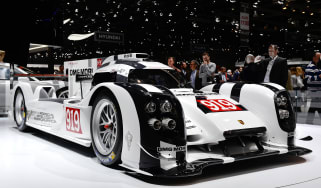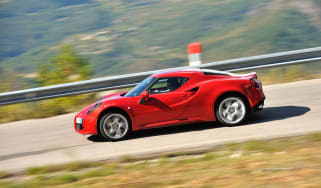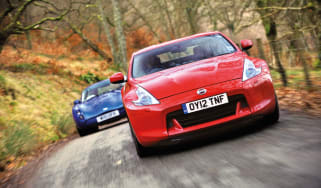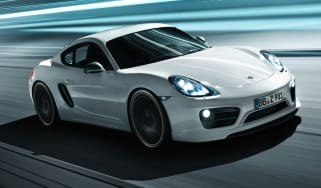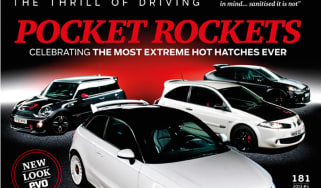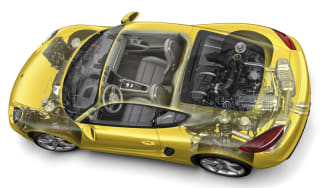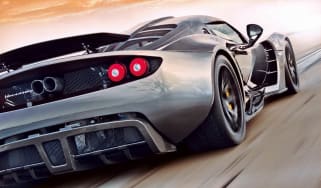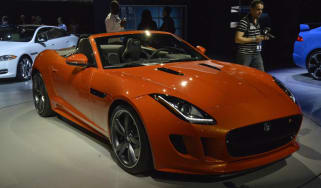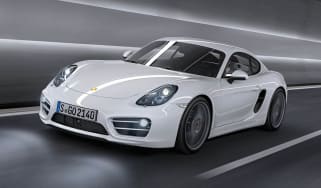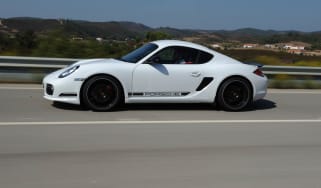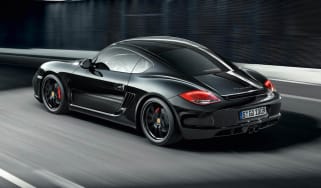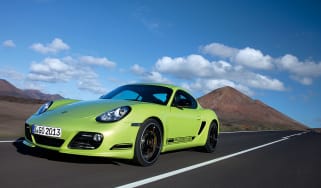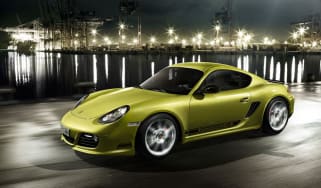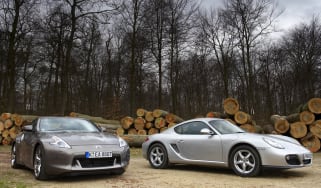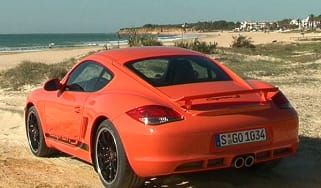Porsche 718 Cayman (2016 - 2025) review – the ultimate all-round sports car
Porsche has finally waved off the 718 Cayman after a nine-year run. It goes out much as it arrived – as the sports car benchmark
The Porsche 718 Cayman departs Porsche’s line-up as one of the best all-round sports cars it’s ever had in its offering. The years under the platform’s wheels (its bones date all the way back to 2012) have left none in doubt of its status as a standard-bearing sports car, right to the end.
In truth, by the time of the 718’s 2016 arrival, the Boxster and Cayman had already overcome the old ‘poor man’s 911’ brand, at least to drive if not in the lagging perceptions of the wider sports car buying public. If the four-cylinder left plenty to be desired in the powertrain personality department, the singing six-cylinder of the GTS 4.0 in combination with the 718’s enduring balance, composure and precision saw it out as a Porsche sports car great. Whether as an EV or as the newly announced top-spec combustion versions, the next Cayman has its work cut out as a successor.
> RML GT Hypercar review – the Porsche 911 taken to the ultimate extreme
Engine, gearbox and technical highlights
The 718’s story actually begins with the 981, which launched in 2012 with an all-new body-in-white that was 40 per cent more rigid while being 47kg lighter. It was also 40mm wider at the front and 18mm wider at the rear than the titchy 987 it succeeded. The 981 was broader of footprint, more exotic to look at with its mini Carrera GT styling and more sophisticated – active engine mounts joined the options list alongside PDCC adaptive dampers, as well as the first (maligned) outing for Porsche’s electric power steering, replacing the feelsome old hydraulic set-up.
More reviews
Reviews
- Porsche Cayman Style Edition 2025 review – substance to match the Alpine A110?
- Porsche 718 Cayman GT4 RS review: the ultimate mid-engined sports car?
- Porsche 718 Cayman T review - is less more for this Alpine A110 rival?
- Porsche 718 Cayman GTS (2017-2020) review
- Porsche 718 Cayman S review - still the best sports car you can buy?
All of these features carried over in revised form to the 718 when it arrived in 2016 as a significant facelift. The suspension settings were stiffer and the styling overhauled too. It also brought a pair of new, somewhat bland turbocharged flat four-cylinder engines in 2-litre and 2.5-litre forms to replace the singing 2.7-litre and 3.4-litre engines of the 981.
The standard 718 and Cayman S were joined in 2018 by the rortier GTS (still with the four-cylinder engine) and the stripped-back Cayman T. The 718 GT4 (and 718 Spyder) arrived in 2019 with a 4-litre naturally aspirated engine based on the block of the 3-litre twin-turbo in the 992, bringing back evocative flat-six power to the Cayman lineup.
The knockout car all will remember the 718 generation for is of course the GT4 RS, a GT3-engined, swan neck-winged track special with intake resonance to rival a McLaren F1. It was a car that proved exhilarating but too intense on the road for many testers’s tastes .
The GT4, GT4 RS, Spyder and Spyder RS get all the attention as the models lavished with toys, engineering attention and extra power. Nevertheless, even with the slightly lumpy lower-end engines, the 718’s lithe body, simple clean lines and pure driving dynamics haven’t dulled in their brilliance over the years.
Power, torque and 0-62mph
The 2-litre makes 296bhp at 6500rpm and 280lb ft from 2150 to 4500rpm and the S 345bhp at 6500rpm and 310lb ft from 2100 to 4500rpm. Thankfully a six-speed manual transmission option was retained, alongside the ubiquitous PDK. The 0-62mph sprint takes a respective 5.1sec and 4.6sec in the most basic Caymans.
Even if they weren’t the most evocative engines, technically they were very impressive, their biggest advantage being the useable torque they both produce at lower engine speeds. This abundance of torque helps the 718 overcome the one chink in the old Cayman’s otherwise blemish-free armour – its long gearing.
In the case of the GTS and GT4, their outputs need revs. The 394bhp GTS delivers in full at 7000rpm before hitting the limiter at 7800, while the 414bhp GT4 comes good at 7600rpm, ahead of the 8000rpm limit. Similarly, they both share a 310lb ft peak torque figure that requires 5000rpm on the clock to achieve, though it does last until 6800rpm.
The 3.4-litre engine in the old Cayman S only managed 273lb ft at a lofty 4500rpm, and so the tall ratios often made it feel a bit gutless in slower corners, or when the engine wasn’t quite on song. With four litres of capacity in what are relatively light cars, there’s a broader well of shove to plumb in the GTS and GT4 than Caymans of old lower down the rev range.
The GTS 4.0 gets to 62mph in 4.5sec, while the GT4 manages a manually-shifted 4.4sec. The wild GT4 RS zings up to 9000rpm, producing 493bhp and 332lb-ft along the way. Run it through the gears from a standstill and you’ll hit 62mph in just 3.4sec.
Performance ride and handling
- Four-pots can’t trump the 4.0’s personality with punch…
- … but ponderous gearing makes you appreciate the low-down torque
- Excellent balance, composure and precision
In the torque-rich turbo engines, you don’t necessarily change gear any more frequently than before, given the wide torque bands in each gear. There’s just less penalty for an early change simply to enjoy the tactile, mechanical action.
There are times when even the 4-litre six-cylinder Caymans that’re much guttsier than the old 2.7 and 3.4, can actually feel a little flat next to the turbocharged models – when punching out of a tight hairpin, for example.
Yawning gear ratios – second will get you to 85mph – take the edge off the flat-six’s performance and limit how much of the wonderful sound the engine produces at high revs can be enjoyed on the road. Stick with it, though, and all the sixes come good as their magnificent response and charisma shine through.
Porsche wasn’t as dramatic with changes to the Cayman’s chassis as it was with the lower range’s engines. The delicate and immersive handling for which the Cayman was famous endures.
For a start, the 718 isn’t too big. With space on the road you have a greater freedom over where you place the car, and you’re able to choose your line into and around corners. Sounds like a small point, but as cars (including in all likelihood the 718’s successor) get bigger it's one that's increasingly important.
Everything about the 718 is well considered, whether it’s the ergonomics and seating position or the weight of the steering. It’s simply a satisfying car to use, even when being driven slowly. However, the chassis and the damping exudes quality, making the 718 even more entertaining and capable at higher speeds.
With most of the Cayman’s mass within the wheelbase there’s real agility to the car. Combined with impressive grip, the 718 is capable of changing direction with ease, feeling taut, flat and incisive into corners and through direction changes. There is a slight hint of understeer as you begin to reach its limits, but rather than being frustrating it just helps you gauge how hard you are pushing.
The Porsche Active Suspension Management (PASM) system it allows you to stiffen the dampers on the fly. The softest setting feels fluid and supple but occasionally wants for vertical control, while the stiffer setting ties everything down while remaining liveable on cragged B-roads. Neither of the damper settings feels wildly inappropriate; the stiffer of the two isn’t too firm, and both settings have their place depending on the road or your attitude.
In terms of feel and connection, the 718’s electronic power steering cannot compete with Porsche’s hydraulic systems of old. But there’s enough detail transmitted through the chassis that the supplementary feel you get through the steering wheel is useful, but not actually necessary for you to be truly engaged with the car. Braking performance is very strong, but lesser models don't have the positive bite and solid pedal feel of the GT cars.
Driver’s note
‘The extra torque from the turbocharged engine really allows you to indulge in the chassis’ balance and poise – possibly even more so than with the old naturally aspirated flat-six. The throttle of the 718 has a greater influence over the car when in a corner, making it easier to push the rear axle closer to the limit of grip, although in the base car you still need to commit very hard to overwork the rear tyres.’ – Yousuf Ashraf, evo senior staff writer
Interior and tech
Always surprisingly practical for a mid-engined sports car, the Cayman’s front and rear load areas are plenty big enough to swallow everything two people might need on a weekend away. The rear deck above the engine and behind the occupants’ heads provides extra useful space for small items, too.
This being a Porsche, ergonomics are spot-on, with all the controls perfectly positioned and weighted with a quality feel. The driving position is suitably low and from behind the 918-inspired steering wheel the dash layout has plenty of traditional Porsche touches such as the high-mounted gear lever, and a rev counter right in the centre of the dials.
Materials and build quality are top-notch – they’ll almost doubtlessly age well – but with an infotainment system and switchgear inherited from older generation Porsches, rivals such as the most recent BMW M2 make the tech feel distinctly last generation.
In typical Porsche style most of the truly desirable features were to be found on the options list, but there was enough to customise to turn even a basic Cayman into pretty much your perfect car.
Porsche Exclusive Manufaktur and its range of interior options and endless paint-to-sample shades. It’s expensive, and perhaps something buyers of standard Caymans might shy away from, but could you resist on a GT4?
One or two models in the Cayman range forged their own path anyway, the aforementioned GT4 getting standard bucket seats and Clubsport Package options such as a bolt-in cage and a fire extinguisher, and the Style Edition gaining grey interior stitching and illuminated sill plates.
Prices, rivals and buying guide
The 718 Cayman is finally off sale, having ending its life as a £53,800 prospect in its basic 2-litre manual form. That sounds like pretty good value until you consider the voluminous options list one had to thumb through before arriving at the price of your Cayman – options you’d really rather not do without.
The next step up was the £58,000 Cayman Style Edition, focusing on aesthetics rather than mechanical upgrades, as the name suggests. It paired the most basic Cayman underpinning with a contrasting graphics pack and optional Spyder wheels, along with the option of a retro Rubystar Neo paint colour. Black or white exterior badging, dark exhaust tips, embossed headrests and illuminated sills also feature.
The step up to a Cayman S meant sliding over a cheque for £63,800, which not only gets you the larger, more powerful 2.5-litre engine, but also some of the extra desirable equipment that the regular Cayman lacked.
The Cayman T used to fill the space between the S and the £75,300 GTS but was discontinued early. While the GTS commanded a serious premium over the next model down, it also packed a naturally-aspirated 4-litre flat six to deliver the kind of scintillating drive we've yearned for since the 718 launched with a four-cylinder engine.
Along with the powertrain, the GTS got subtle chassis upgrades and a range of bespoke styling elements, including a very smart set of 20-inch wheels and Sport Design bumpers. Some might see it as a more usable Cayman GT4, which was discontinued as the GT4 RS came online, but it doesn't quite have GT car levels of focus.
The £127,999 GT4 RS was a different animal altogether, with an extreme blend of power, grip and aggression. Sometimes too extreme.
Over the years the Cayman has faced and defeated myriad rivals. The Audi TT has always been its less driver-focused but still stylish and nicely constructed Teutonic cousin. From BMW, the M2 arrived as a small performance coupe if not a dedicated sports car but it was a car that reached a Cayman-busting zenith in the M2 CS. The Toyota Supra was a worthy contender if not one that was ever really within a shout of the Cayman’s crown. Later versions of the Lotus Evora and the Lotus Emira were in there too, albeit without the same level of polish and latterly, at a much higher price point than say, a 4-litre GTS.
The closest competitor? Of course the Alpine A110, which unlike almost any other Cayman rival, doubled down on much that it trades on – lightness, compactness, balance, delicacy. The A110 was even lighter, even more compact, even more compliant. In many ways it was the perfect sports car for the UK. The Cayman can leverage its soulful flat-six (in GTS form), manual transmission option and arguably superior Porsche cabin quality. But as a driving experience, the A110 runs it close for thrills.
Alternatives? The eCoty-winning F87 BMW M2 CS can be had for similar money to a used GT4 or GTS. Likewise an Alpine A110 GT can be had for similar money to a nearly new basic Cayman, while the earliest A110s now start at under £40k.
Buying guide
The 718 Cayman has only just gone off sale and as a result there is still plentiful availability at all Porsche centres. These are cars that hold money well, even if they’re not the SMP500-busting asset that a PTS 911 S/T might be.
If buying privately, you’ll want a comprehensive service history with documentation. You’ll want to see tyres that are young enough and in good condition, likewise the brakes. You’ll want to check your chosen example hasn’t been over-revved – a specialist will be able to tell you this and go over numerous other checkpoints.
The optional active engine mounts are a common failure point, so be sure the ones on your chosen car are working properly, if applicable. Many owners swap theirs out for polybushed mounts – not as refined but much cheaper to replace than the c/£1200 you’ll pay per mount.
Click on the links below for our reviews of the other Porsche 718 Cayman models in the range
- Porsche Cayman
- Porsche Cayman Style Edition
- Porsche Cayman S
- Porsche Cayman T
- Porsche Cayman GTS 4.0
- Porsche Cayman GT4
- Porsche Cayman GT4 RS
